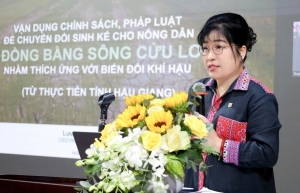Addressing global climate change: The solution lies in the numbers
 |
| James Abdey |
The insights were shared by James Abdey, deputy academic director of International Programmes at the London School of Economics and Political Science (LSE) at a specialised symposium in July
The event was jointly organised at the British University Vietnam campus in Hung Yen province and involved a high-level delegation from the University of London and LSE.
Abdey illustrated an application of data analysis in addressing major global issues, specifically global climate change, focusing on Vietnam.
“In a world driven by data, modern data analytics models will enhance our understanding of climate change,” Abdey said. “If oil initiated a revolution across the world in the 20th century, data would ignite a revolution in the 21st century. And data is the new oil of the world."
As a highly applicable field with potential across numerous sectors, data is increasingly being chosen by many young people, but there is a modest number of universities offering training.
Data can assist in the climate change narrative in three main ways: educating the public, thereby fostering a better understanding of climate change issues; reducing misconceptions, identifying the causes of climate change problems; and providing possible future scenarios.
According to Abdey, addressing the issue of climate change necessitates an understanding of it.
"Therefore, data presentation and visualisation are crucial. Data only becomes valuable when it is rendered meaningful rather than appearing as disparate pieces of information," he said.
In Vietnam, weather forecasting agencies, meteorological centres, and numerous media outlets have begun to employ data visualisation tools to communicate and forecast, especially in the context of climate change, which has heightened the severity of natural disasters in the first half of 2024.
“A picture is worth a thousand words, and with appropriate visualisation models, viewers can see thousands of data points telling a story. This allows climate scientists to convey the urgency of the climate crisis to policymakers, businesses, and the public,” he emphasised.
 |
Additionally, through climate data models, those interested in the issue can better understand the underlying causes of current problems.
“The distinction between correlation and causation is a crucial concept that helps viewers correctly interpret data. Accurate data visualisation helps to elucidate the nature of the issue and avoid misleading conclusions,” he said.
Through historical climate databases, scientists can predict future trends and assess impacts under various scenarios. This predictive power enables the formulation of effective climate policies and strategies.
"For instance, models can forecast how global temperature increases will affect sea levels, thereby assisting coastal cities in future adaptation efforts. From predicting energy demands to the extent of wildfire spread, data tools will help mitigate the impacts of climate change,” Abdey explained.
This highlights how data science provides significant practical value by transforming numbers into meaningful information, knowledge, and even actionable insights. To achieve this, Abdey added, people need to enhance their knowledge and delve deeper into the field of data analysis.
 | Vietnam, UK expand climate change cooperation Vietnam and the United Kingdom are expanding cooperation in response to climate change, with a new multi-year climate programme in the pipeline. Iain Frew, British Ambassador to Vietnam, spoke to VIR’s Bich Thuy about how this expanded climate collaboration supports Vietnam on its net-zero path. |
 | Carbon capture must quadruple by 2050 to meet climate targets: report By 2050, humanity must durably remove four times as much CO2 from the air as today to cap global warming below the crucial target of two degrees Celsius, researchers said Tuesday. |
 | Solutions to promote sustainable livelihoods in Mekong sub-region It is necessary to quickly apply new regulations of the Land Law 2024 on agricultural land use to effectively transform farmers' livelihoods in the Mekong delta; identifying climate change and rising sea levels as inevitable trends to have flexible adaptation solutions, helping to turn challenges into opportunities. |
 | Tackling climate change crisis through innovation and tech My recent visit to Vietnam illustrated many of the challenges of growing economies in facing climate change, whose consequences are becoming increasingly dire. Vietnam shows how a country can take action and use innovative mechanisms and technology to enable a path to green and sustainable growth. |
 | Accelerating transition for a greener industrial sector Vietnam’s industrial sector, a pivotal contributor to the country’s rapid economic ascension, now faces an urgent imperative. Paul Fisher, country head of JLL Vietnam, explains how it must transition to greener, sustainable practices amidst mounting concerns about climate change. |
What the stars mean:
★ Poor ★ ★ Promising ★★★ Good ★★★★ Very good ★★★★★ Exceptional
 Tag:
Tag:
Related Contents
Latest News
More News
- Agro-forestry and fisheries exports jump nearly 30 per cent in January (February 09, 2026 | 17:45)
- Canada trade minister to visit Vietnam and Singapore (February 09, 2026 | 17:37)
- New tax incentives to benefit startups and SMEs (February 09, 2026 | 17:27)
- Vietnam forest protection initiative launched (February 07, 2026 | 09:00)
- China buys $1.5bn of Vietnam farm produce in early 2026 (February 06, 2026 | 20:00)
- Vietnam-South Africa strategic partnership boosts business links (February 06, 2026 | 13:28)
- Mondelez Kinh Do renews the spirit of togetherness (February 06, 2026 | 09:35)
- Seafood exports rise in January (February 05, 2026 | 17:31)
- Accelerating digitalisation of air traffic services in Vietnam (February 05, 2026 | 17:30)
- Ekko raises $4.2 million to improve employee retention and financial wellbeing (February 05, 2026 | 17:28)




























 Mobile Version
Mobile Version